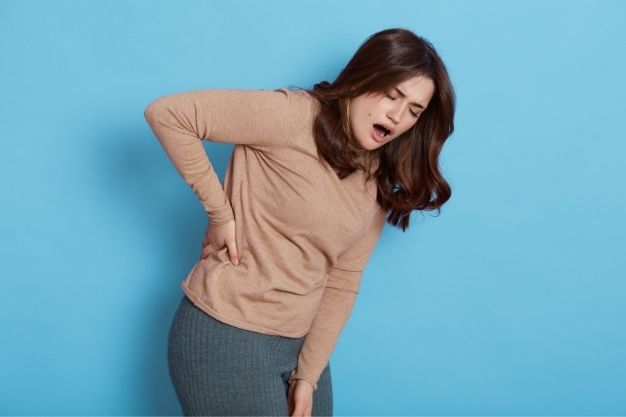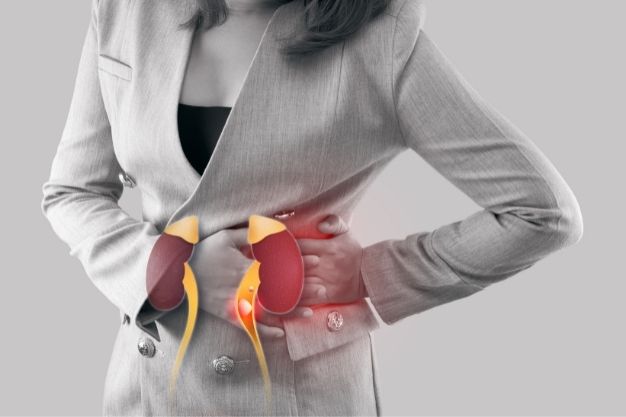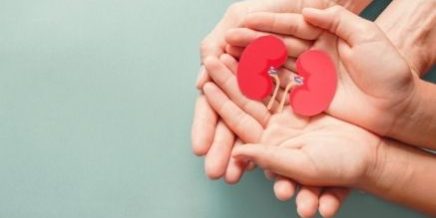The pain of having a kidney stone has been described as the worst in the world. Of course, labor pains during deliveries would come first though. Kidney stones are becoming more common, particularly in women. This page discusses kidney stones in women and homeopathy treatment.
What are Kidney Stones?
Kidney stones are tiny, hard crystals formed in the kidney due to the kidney’s filtering of minerals such as calcium. Similar to how hard water causes hard particles to form in your teapot. They may be little, much smaller than a pea, yet they can make you scream while passing out though!
They are normally asymptomatic when developing in the kidney, but as they travel through the extremely narrow tube called the ureter, they can become lodged and produce severe agony known as renal colic.
Kidney stones are characterized by frequent intense pain in your back or side that may spread to your pelvis when the stone passes down to the bladder. It is frequently linked with nausea, vomiting, and frequent urination. There might be blood in your pee. Except for delivery, there is nothing exactly like it.

What is the location of kidney stone pain?
A kidney stone causes severe pain that shifts as the stone passes through your urine tract. The most prevalent sites to experience pain are:
- groin or lower abdomen
- Below your ribs on one side of your body
- The lower back
“The pain linked with a kidney stone is often not noticed until it has formed; It is moving through your urinary tract,” experts added. “Furthermore, men and women report kidney stone pain significantly differently due to physical differences. Not to mention that pain is relative, with everyone having a different pain tolerance.”
Furthermore, the degree of the pain isn’t always a good indicator of how serious the kidney stone is or will become. Smaller stones, which are more likely to pass on their own, nevertheless can cause severe pain. And not every kidney stone that needs medical attention is extremely unpleasant.
Who are the people most affected by Kidney Stones?
Kidney stones aren’t a recent concept. However, kidney stones are growing increasingly widespread, particularly among women. We used to assume that kidney stones were just an issue for middle-aged men, but they’re now more frequent in middle-aged women and can be dangerous during pregnancy.
Once a person has had one kidney stone, they have a 50/50 probability of having another. Kidney stones currently harm one in every ten males and one in every twelve women throughout their lifetime. Kidney stones include a variety of minerals, the most frequent of which are calcium-containing stones. Some disorders, such as gout or an overactive parathyroid gland, are linked to kidney stones in women, but the most frequent stones usually happen.
Why are kidney stones becoming more common in women?
Obesity, a high-salt diet, increased sugar, and diabetes is risk factors for stone formation. Over the last 30 years, these hazards have grown for women. Several recent research investigated the hazards of kidney stones in women. The women’s health initiative study tracked 82,000 postmenopausal women. Women who did not develop stones consumed more fiber, fruits, and vegetables and consumed less sugar.
Unfortunately, women who had already had stones did not appear to reduce their chance of obtaining them by eating a high-fiber, fruit-and-vegetable-rich diet. So, as a stone former, you’re kind of trapped. Another research of thousands of women found that a high-calcium diet was slightly risky.
When should you see a doctor?
When you see any signs and symptoms that bother you, make an appointment with the doctor.
Seeking medical assistance if you have any of the following symptoms:
- You can’t sit still or find a comfortable posture because you’re in unbearable pain
- Vomiting followed by pain
- Headache that is followed by a fever and chills
- Urine with blood
- Passing urine with difficulty
Symptoms
A kidney stone normally does not produce symptoms until it moves about within your kidney or enters your ureters — the tubes that link your kidneys and bladder. If it becomes caught in the ureters, it can obstruct urine flow, causing the kidney to enlarge and the ureter to spasm, both of which can be extremely painful.
You may notice the following indications and signs:
- Intense discomfort in the side and back, just behind the rib cage
- Pain in lower abdomen and groin
- Pain with varying degrees of severity
- You may feel discomfort or burning sensation while urinating
Other indicators and signals to be aware of include:
- Urine that really is pink, red, or brown
- Urine that is turbid or stinky
- A constant urge to pee, urinating more often than normal or urinating in small amounts
- Vomiting with nausea
- If infection persists, fever and chills may occur
As a kidney stone passes through your urinary tract, the pain it causes may alter — for example, migrating to a different spot or rising in severity.
Causes
Kidney stones are frequently caused by a combination of circumstances, and a combination of variables may raise your risk.
Kidney stones starts persisting when your urine gets over saturated due to higher concentrations of crystal-forming chemicals in urine, such as calcium oxalate and uric acid. Simultaneously, your urine may be lacking in chemicals that prevent crystal formation, creating favourable environment for kidney stones to grow.

5 Ways Your Diet Can Aid in the Prevention of Kidney Stones
So, if you want to prevent kidney stones, what should you do?
- A high-salt diet, processed foods, canned foods, cheeses, bottled salad dressings, high-salt snack foods, and baked products should all be avoided. Avoiding these items is already part of a healthy diet, and the growth of these foods in our diet has been linked to the obesity pandemic
- Pizza is the poster meal for kidney stones, thanks to the salty crust, pepperoni, cheese, and salty processed pizza sauce, but you can create your own with less salt
- Consume your fiber, as well as your fruits and vegetables, without salt
- Make sure you drink plenty of water. Stone formation is increased by dehydration or a decrease in fluid consumption
- The calcium topic is complicated. Some research indicates that increasing calcium raises the risk, whereas others do not. Please don’t limit your calcium intake, but don’t overdo it either because some calcium sources, such as cheese, are rich in salt
- Keep a healthy weight. Obesity is a concern, but perhaps it’s the food’s association with obesity.
- If you’ve had a stone, speak with your doctor about the type of stone you had. What minerals were involved in crystal formation, and what should you do to reduce your chances of recurrence?
- Eat your fruits and vegetables, keep your stomach happy with a high-fiber diet, and remain hydrated if you want to prevent the worst pain ever.
Homeopathy treatment
There might be a ton of natural remedies mentioned across the web claiming that they can cure Kidney stones. However, people should see their homeopath to determine the root cause and receive appropriate homeopathic treatment.
A doctor may create a treatment plan to help women with kidney stones. Home remedies can assist avoid us from developing in the future and naturally ease symptoms. Homeopathy treatment can treat kidney stones in women permanently. It works by increasing vital energy and improving immune responses in the body.
We provide the most effective homeopathy treatment for Kidney stones. Dr. Positive Homeopathy’s comprehensive approach guarantees that the core cause of the disease is identified and appropriate therapy is delivered.
Our safe and effective kidney stone treatment will relieve the intense pain, while also preventing the stones from further growth. Our experienced doctor’s recommendations and actions will help the sufferer live a normal and smooth everyday life free of difficulties.
Contact us today to learn more about Dr. Positive Homeopathy’s treatments and services.








